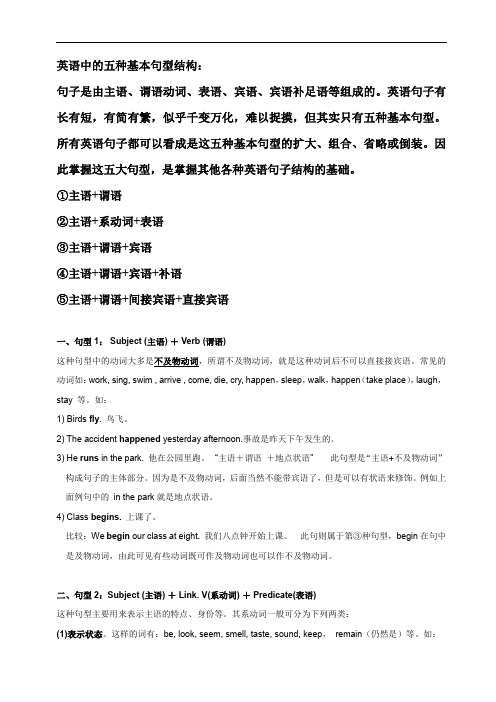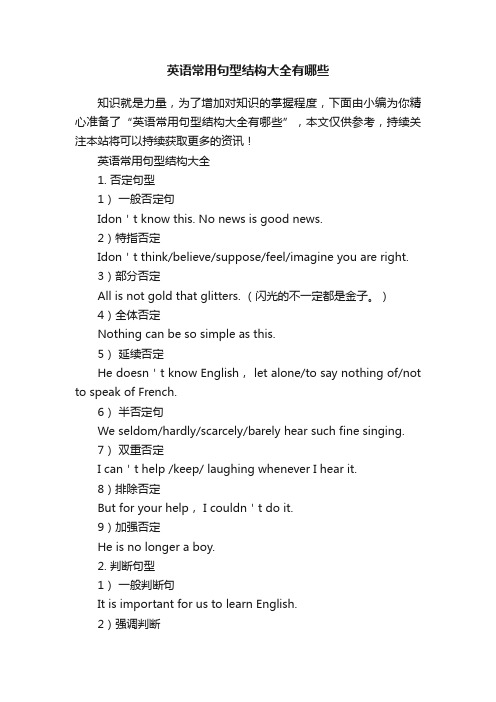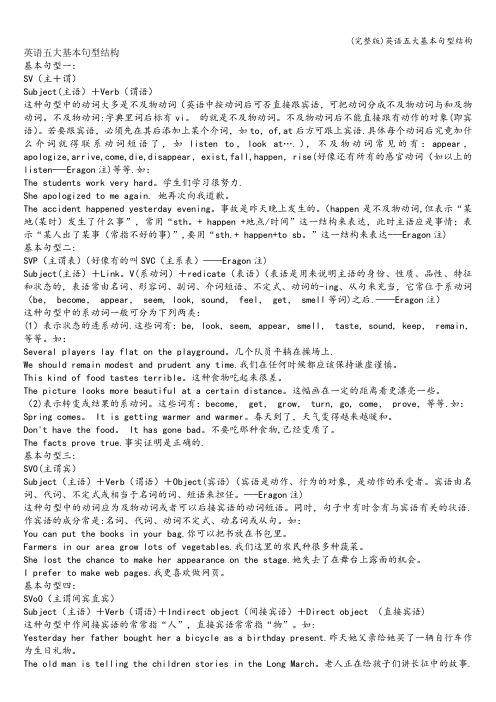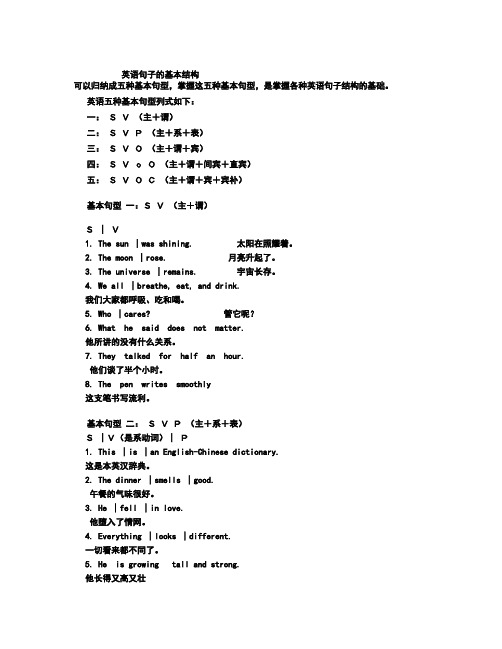各种英语句型结构总结
初中英语句型结构总结

初中英语句型结构总结1.主语+动词+宾语例如:I eat an apple.(我吃了一个苹果)2.主语+动词+间接宾语+直接宾语例如:My mother bought me a new book.(我妈妈给我买了一本新书)3.主语+动词+宾语+宾语补足语例如:She made him happy.(她让他开心)4.主语+动词+宾语+宾语补足语+宾语补足语补足语例如:We elected her the monitor of the class.(我们选她当班长)5.主语+动词+副词例如:He runs fast.(他跑得快)6. 主语 + be 动词 + 表语例如:I am a student.(我是一个学生)7. There be 句型例如:There is a pen on the desk.(桌子上有一支笔)8. 主语 + do/does/did + 动词原形例如:She does her homework every day.(她每天做作业)9. 主语 + have/has + 动词过去分词例如:I have finished my homework.(我已经完成了作业)10. 主语 + be + 动词-ing例如:He is playing soccer.(他正在踢足球)11. 主语 + be + 表语例如:She is a doctor.(她是一名医生)12. 主语 + be + 动词过去分词例如:The cake is eaten.(蛋糕被吃掉了)13. 主语 + vt. + 宾语 + to do例如:He asked her to help him.(他请求她帮助他)14. 主语 + vt. + 宾语 +doing例如:I heard him singing in the shower.(我听见他在淋浴时唱歌)15. 主语 + vt. + 宾语 + for + 宾语 + to do。
英语中的五种基本句型结构

英语中的五种基本句型结构英语中的五种基本句型结构:句子是由主语、谓语动词、表语、宾语、宾语补足语等组成的。
英语句子有长有短,有简有繁,似乎千变万化,难以捉摸,但其实只有五种基本句型。
所有英语句子都可以看成是这五种基本句型的扩大、组合、省略或倒装。
因此掌握这五大句型,是掌握其他各种英语句子结构的基础。
①主语+谓语②主语+系动词+表语③主语+谓语+宾语④主语+谓语+宾语+补语⑤主语+谓语+间接宾语+直接宾语一、句型1: Subject (主语) + Verb (谓语)这种句型中的动词大多是不及物动词,所谓不及物动词,就是这种动词后不可以直接接宾语。
常见的动词如:work, sing, swim , arrive , come, die, cry, happen,sleep,walk,happen(take place),laugh,stay 等。
如:1) Birds fly. 鸟飞。
2) The accident happened yesterday afternoon.事故是昨天下午发生的。
3) He runs in the park. 他在公园里跑。
“主语+谓语+地点状语”此句型是“主语+不及物动词”构成句子的主体部分。
因为是不及物动词,后面当然不能带宾语了,但是可以有状语来修饰。
例如上面例句中的in the park就是地点状语。
4)Class begins. 上课了。
比较:We begin our class at eight. 我们八点钟开始上课。
此句则属于第③种句型,begin在句中是及物动词,由此可见有些动词既可作及物动词也可以作不及物动词。
二、句型2:Subject (主语) + Link. V(系动词) + Predicate(表语)这种句型主要用来表示主语的特点、身份等。
其系动词一般可分为下列两类:(1)表示状态。
这样的词有:be, look, seem, smell, taste, sound, keep,remain(仍然是)等。
英语中的五种基本句型结构

英语中的五种基本句型结构:句子是由主语、谓语动词、表语、宾语、宾语补足语等组成的。
英语句子有长有短,有简有繁,似乎千变万化,难以捉摸,但其实只有五种基本句型。
所有英语句子都可以看成是这五种基本句型的扩大、组合、省略或倒装。
因此掌握这五大句型,是掌握其他各种英语句子结构的基础。
①主语+谓语②主语+系动词+表语③主语+谓语+宾语④主语+谓语+宾语+补语⑤主语+谓语+间接宾语+直接宾语一、句型1: Subject (主语) + Verb (谓语)这种句型中的动词大多是不及物动词,所谓不及物动词,就是这种动词后不可以直接接宾语。
常见的动词如:work, sing, swim,arrive,come, die, cry, happen,sleep,walk,happen(take place),laugh,stay 等。
如:1) Birds fly. 鸟飞。
2) The accident happened yesterday afternoon.事故是昨天下午发生的。
3) He runs in the park. 他在公园里跑。
“主语+谓语+地点状语”此句型是“主语+不及物动词”构成句子的主体部分。
因为是不及物动词,后面当然不能带宾语了,但是可以有状语来修饰。
例如上面例句中的in the park就是地点状语。
4)Class begins.上课了。
比较:We begin our class at eight. 我们八点钟开始上课。
此句则属于第③种句型,begin在句中是及物动词,由此可见有些动词既可作及物动词也可以作不及物动词。
二、句型2:Subject (主语) + Link. V(系动词) + Predicate(表语)这种句型主要用来表示主语的特点、身份等。
其系动词一般可分为下列两类:(1)表示状态。
这样的词有:be, look, seem, smell, taste, sound, keep,remain(仍然是)等。
英语五种基本句型结构总结讲义

英语中的五种基本句型结构一、句型1: Subject (主语) + Verb (谓语)这种句型中的动词大多是不及物动词, 所谓不及物动词就是这种动词后不可以直接接宾语。
常见的动词如: work, sing, swim, fish, jump, arrive, come, die, disappear, cry, happen等。
如:1) Li Ming works very hard.李明学习很努力。
2) The accident happened yesterday afternoon.事故是昨天下午发生的。
3)Spring is coming.4) We have lived in the city for ten years.☆可以做主语的--------主要由名词、代词或相当于名词的单词,短语或从句充当.一.名词、代词、数词作主语David arrived last night.大卫昨晚到达.Who is speaking, please(在中)请问您是谁That's OK.这没问题.Two will be enough.两个就够了.Two-thirds of the workers are women.三分之二的工人是女工.二.ing形式作主语Skating is good exercise.溜冰是很好的运动.Looking up all the new words in the dictionary took him a lot of time.Making a marriage work can take a lot of effort.Losing her new bicycle made Mary so upset.三.to不定式作主语To translate this ideal into reality needs hard work.把理想转变成现实需要辛勤的劳动.To love and to be love are the greatest happiness in the word.四.the+adj作主语The blind and the lame are well cared for in our country.在我们国家,盲人和肢残人受到很好的照顾.The unemployed usually lead a hard life.失业的人生活一般很困难.五.从句作主语What has happened proves that our policy is right.发生的一切证明我们的政策是对的. Whether we'll go depends on the weather.我们是否去要看天气.六.短语作主语How to do well is an important question.如何把这件事做好是一个重要问题.Early to bed and early to rise makes a man healthy.早睡早起身体好.七、it做形式主语1.It's no good sitting up too late.2.It seems as if it is going to rain.二、句型2: Subject (主语) + Link.V(系动词) + Predicate(表语)这种句型主要用来表示主语的特点、身份等。
英语常用句型结构大全有哪些

英语常用句型结构大全有哪些知识就是力量,为了增加对知识的掌握程度,下面由小编为你精心准备了“英语常用句型结构大全有哪些”,本文仅供参考,持续关注本站将可以持续获取更多的资讯!英语常用句型结构大全1. 否定句型1)一般否定句Idon't know this. No news is good news.2)特指否定Idon't think/believe/suppose/feel/imagine you are right.3)部分否定All is not gold that glitters. (闪光的不一定都是金子。
)4)全体否定Nothing can be so simple as this.5)延续否定He doesn't know English, let alone/to say nothing of/not to speak of French.6)半否定句We seldom/hardly/scarcely/barely hear such fine singing.7)双重否定I can't help /keep/ laughing whenever I hear it.8)排除否定But for your help, I couldn't do it.9)加强否定He is no longer a boy.2. 判断句型1)一般判断句It is important for us to learn English.2)强调判断It is English that we should learn.3)弱式判断You look/seem as if/as thought you had been there before.4)正反判断That sounds all right, but in fact it is not.5)互斥判断Either he is right or I am.6)注释判断He is a walking dictionary,that is (to say),he can remember many English words.7)比较判断It is more a picture than a poem.3. 祝愿祈使句式1)一般句式Study hard and keep fit.2)强语式Never tell a lie.3)委婉祈使句What/How/ about going there on foot?4)建议祈使句Suppose/supposing you pick me up at about six?5)祝愿句Allow me to propose a toast to our friendship!4. 感叹句型What nice weather it is!5. 疑问句型1)一般疑问句Do you the way to the station?2)反意疑问句It is quite cheap, don't you think?3)特殊疑问句What ever do you mean by saying this?4)选择疑问句Is he a doctor or a nurse?5)间接疑问句What do you think/say/suppose I should do?6.数词句型1)表数目He is more than/over/ at least not less than 20.2)表年月日He was born on April 22, 1994/in 1994/on the morning of October 1.3)表年龄He is 20 years old. = He is 20 years of age.4)表倍数The output of coal was 200% greater than in 1998.5)表计量It costs me 100 yuan. / It is worth 100 yuan.7. 关联指代句型1)两项关联One the one hand, I am your teacher, and on the other hand, I am also you friend.2)先后顺序At first/in the beginning/ he word hard. Later/Afterwards he is not so diligent.3)修饰限制Don't trust such a man as over praise /One/Those/They who should come failed to appear.4)两项连接The old worker has experience and knowledge as well.5)加和关系In addition to 'if', there are many other conjunctions that can introduce conditional clauses.8. 比较句型1)等比句The lab is no better than a cottage.2)差比句Ispeak English worse than he does. / He is not so/as tall as I am.3)极比句None/No one/ is so blind as those that won't see.4)比例句The more a man knows, the more he feels his ignorance.5)择比句He is taller than any other boy in the class.6)对比句They are working hard while you are wasting your time.9.比喻类句型He speaks English as if/ as though he was a foreigner.10.条件假设句1)一般事实If we succeed, what will the people say?2)虚拟条件句If you had seen it, you would have been moved.3)反条件句Unless you try, you'll never succeed.4)唯一条件句If only I have another chance, I shall do better.5)推论条件句Now that you are grown up, you must stop this behavior.大学英语作文常用句型因果推理法常用句型use/Since we read the book, we have learned a lot. 由于阅读这本书,我们已经学到了很多。
(完整版)英语五大基本句型结构

英语五大基本句型结构基本句型一:SV(主+谓)Subject(主语)+Verb(谓语)这种句型中的动词大多是不及物动词(英语中按动词后可否直接跟宾语,可把动词分成不及物动词与和及物动词。
不及物动词:字典里词后标有vi。
的就是不及物动词。
不及物动词后不能直接跟有动作的对象(即宾语)。
若要跟宾语,必须先在其后添加上某个介词,如to,of,at后方可跟上宾语.具体每个动词后究竟加什么介词就得联系动词短语了,如listen to,look at….),不及物动词常见的有:appear,apologize,arrive,come,die,disappear,exist,fall,happen,rise(好像还有所有的感官动词(如以上的listen-—Eragon注)等等.如:The students work very hard。
学生们学习很努力.She apologized to me again. 她再次向我道歉。
The accident happened yesterday evening。
事故是昨天晚上发生的。
(happen是不及物动词,但表示“某地(某时)发生了什么事”,常用“sth。
+ happen +地点/时间”这一结构来表达,此时主语应是事情;表示“某人出了某事(常指不好的事)”,要用“sth.+ happen+to sb。
”这一结构来表达-—Eragon注)基本句型二:SVP(主谓表)(好像有的叫SVC(主系表)——Eragon注)Subject(主语)+Link。
V(系动词)+redicate(表语)(表语是用来说明主语的身份、性质、品性、特征和状态的,表语常由名词、形容词、副词、介词短语、不定式、动词的-ing、从句来充当,它常位于系动词(be, become, appear, seem, look, sound, feel, get, smell等词)之后.——Eragon注)这种句型中的系动词一般可分为下列两类:(1)表示状态的连系动词.这些词有:be, look, seem, appear, smell, taste, sound, keep, remain,等等。
各种英语句型结构总结

英语句型结构繁多,但可以分为两大类:简单句和复合句。
简单句由一个主语和一个谓语组成,而复合句由一个主句和若干个从句组成。
下面我们将对各种英语句型结构进行总结。
1. 简单句:
简单句的基本结构是主语+谓语。
根据谓语的词性,简单句可分为:
- 肯定句:主语+谓语(be/do/has/will等);
- 疑问句:疑问词+主语+谓语(be/do/has/will等);
- 否定句:not+主语+谓语;
- 感叹句:What/How+陈述句。
2. 复合句:
复合句由一个主句和若干个从句组成。
从句包括:
- 名词从句(主语从句、宾语从句、表语从句、定语从句);
- 状语从句(时间状语从句、地点状语从句、原因状语从句、结果状语从句、目的状语从句、让步状语从句、方式状语从句);
- 定语从句(关系代词引导的定语从句、关系副词引导的定语从句);
- 宾语从句(由连接词引导的宾语从句)。
3. 倒装句:
倒装句是指将谓语的一部分(如助动词、情态动词或be动词)放在主语前面的句子结构。
常见的倒装句有:
- 表示强调的倒装句:In the forest wandered a majestic tiger.
- 表示方位的倒装句:Under the bridge flowed a gentle stream.
- 表示条件的倒装句:Never will he regret his decision.
4. 被动句:
被动句是指主语是动作的承受者的句子结构。
被动句的基本结构是:
- 助动词be+及物动词的过去分词。
英语语法基础基本句型结构

英语句子的基本结构可以归纳成五种基本句型,掌握这五种基本句型,是掌握各种英语句子结构的基础。
英语五种基本句型列式如下:一:SV(主+谓)二:SVP(主+系+表)三:SVO(主+谓+宾)四:SVoO(主+谓+间宾+直宾)五:SVOC(主+谓+宾+宾补)基本句型一:SV(主+谓)S│V1. The sun │was shining. 太阳在照耀着。
2. The moon │rose. 月亮升起了。
3. The universe │remains. 宇宙长存。
4. We all │breathe, eat, and drink.我们大家都呼吸、吃和喝。
5. Who │cares? 管它呢?6. What he said does not matter.他所讲的没有什么关系。
7. They talked for half an hour.他们谈了半个小时。
8. The pen writes smoothly这支笔书写流利。
基本句型二:SVP(主+系+表)S│V(是系动词)│P1. This │is │an English-Chinese dictionary.这是本英汉辞典。
2. The dinner │smells │good.午餐的气味很好。
3. He │fell │in love.他堕入了情网。
4. Everything │looks │different.一切看来都不同了。
5. He is growing tall and strong.他长得又高又壮6. The trouble is that they are short of money. 麻烦的是他们缺少钱。
基本句型三:SVO(主+谓+宾)S│V(及物动词)│O1. Who │knows │the answer? 谁知道答案?2. She │smiled │her thanks. 她微笑表示感谢。
3. He │enjoys │reading. 他喜欢看书。
- 1、下载文档前请自行甄别文档内容的完整性,平台不提供额外的编辑、内容补充、找答案等附加服务。
- 2、"仅部分预览"的文档,不可在线预览部分如存在完整性等问题,可反馈申请退款(可完整预览的文档不适用该条件!)。
- 3、如文档侵犯您的权益,请联系客服反馈,我们会尽快为您处理(人工客服工作时间:9:00-18:30)。
各种英语句型结构总结各种英语句型结构总结一、接不定式(而不接动名词)作宾语的24个常用动词affordtodosth.负担得起做某事agreetodosth.同意做某事arrangetodosth.安排做某事asktodosth.要求做某事begtodosth.请求做某事caretodosth.想要做某事choosetodosth.决定做某事decidetodosth.决定做某事demandtodosth.要求做某事determinetodosth.决心做某事expecttodosth.期待做某事feartodosth.害怕做某事helptodosth.帮助做某事hopetodosth.希望做某事managetodosth.设法做某事offertodosth.主动提出做某事plantodosth.计划做某事preparetodosth.准备做某事pretendtodosth.假装做某事promisetodosth.答应做某事refusetodosth.拒绝做某事wanttodosth.想要做某事wishtodosth.希望做某事注:有些不及物动词后习惯上也接不定式,不接动名词:aimtodosth.打算做某事failtodosth.未能做某事longtodosth.渴望做某事happentodosth.碰巧做某事hesitatetodosth.犹豫做某事struggletodosth.努力做某事二、接不定式作宾补的36个常用动词advisesb.todosth.建议某人做某事allowsb.todosth.允许某人做某事asksb.todosth.请(叫)某人做某事bearsb.todosth.忍受某人做某事begsb.todosth.请求某人做某事causesb.todosth.导致某人做某事commandsb.todosth.命令某人做某事drivesb.todosth.驱使某人做某事electsb.todosth.选举某人做某事encouragesb.todosth.鼓励某人做某事expectsb.todosth.期望某人做某事forbidsb.todosth.禁止某人做某事forcesb.todosth.强迫某人做某事getsb.todosth.使(要)某人做某事hatesb.todosth.讨厌某人做某事helpsb.todosth.帮助某人做某事intendsb.todosth.打算要某人做某事invitesb.todosth.邀请某人做某事leavesb.todosth.留下某人做某事likesb.todosth.喜欢某人做某事meansb.todosth.打算要某人做某事needsb.todosth.需要某人做某事obligesb.todosth.迫使某人做某事ordersb.todosth.命令某人做某事permitsb.todosth.允许某人做某事persuadesb.todosth.说服某人做某事prefersb.todosth.宁愿某人做某事requestsb.todosth.要求某人做某事remindsb.todosth.提醒某人做某事teachsb.todosth.教某人做某事tellsb.todosth.告诉某人做某事trainsb.todosth.训练某人做某事troublesb.todosth.麻烦某人做某事wantsb.todosth.想要某人做某事warnsb.todosth.警告某人做某事wishsb.todosth.希望某人做某事注:不要受汉语意思的影响而误用以下动词句型:汉语说:“害怕某人做某事”,汉语说:“原谅某人做某事”,但英语不说excuse[forgive]sb.todosth.。
汉语说:“拒绝某人做某事”,但英语不说refusesb.todosth.。
汉语说:“惩罚某人做某事”,但英语不说punishsb.todosth.。
汉语说:“建议某人做某事”,但英语不说suggest[propose]sb.todosth.。
汉语说:“赞成某人做某事”,但英语不说approvesb.todosth.。
汉语说:“通知某人做某事”,但英语不说informsb.todosth.。
汉语说:“欢迎某人做某事”,但英语不说welcomesb.todosth.。
汉语说:“坚持某人做某事”,但英语不说insist[persist]sb.todosth.。
汉语说:“希望某人做某事”,但英语不说hopesb.todosth.。
汉语说:“安排某人做某事”,但英语不说arrangesb.todosth.。
汉语说:“要求某人做某事”,但英语不说demandsb.todosth.。
汉语说:“感谢某人做某事”,但英语不说thanksb.todosth.。
汉语说:“祝贺某人做某事”,但英语不说congratulatesb.todosth.。
汉语说:“阻止某人做某事”,但英语不说preventsb.todosth.。
汉语的“原谅某人做某事”,英语可说成excuse[forgive]sb.fordoingsth.。
汉语的“希望某人做某事”,英语可说成wishsb.todosth.。
汉语的“建议某人做某事”,英语可说成advisesb.todosth.。
汉语的“安排某人做某事”,英语可说成arrangeforsb.todosth.。
汉语的“要求某人做某事”,英语可说成demandofsb.todosth.。
汉语的“感谢某人做某事”,英语可说成thanksb.fordoingsth.。
汉语的“祝贺某人做某事”,英语可说成congratulatesb.ondoingsth.。
汉语的“阻止某人做某事”,英语可说成preventsb.fromdoingsth.。
三、接动名词(不接不定式)作宾语的34个常用动词admitdoingsth.承认做某事advisedoingsth.建议做某事allowdoingsth.允许做某事appreciatedoingsth.感激做某事avoiddoingsth.避免做某事considerdoingsth.考虑做某事delaydoingsth.推迟做某事denydoingsth.否认做某事discussdoingsth.讨论做某事dislikedoingsth.不喜欢做某事escapedoingsth.逃脱做某事excusedoingsth.原谅做某事fancydoingsth.设想做某事finishdoingsth.完成做某事forbiddoingsth.禁止做某事forgivedoingsth.原谅做某事giveupdoingsth.放弃做某事keepdoingsth.保持做某事mentiondoingsth.提及做某事minddoingsth.介意做某事missdoingsth.错过做某事pardondoingsth.原谅做某事permitdoingsth.允许做某事practicedoingsth.练习做某事preventdoingsth.阻止做某事prohibitdoingsth.禁止做某事putoffdoingsth.推迟做某事reportdoingsth.报告做某事riskdoingsth.冒险做某事stopdoingsth.停止做某事suggestdoingsth.建议做某事understanddoingsth.理解做某事四、接现在分词作宾补的20个常用动词bringsb.doingsth.引起某人做某事catchsb.doingsth.碰上(撞上)某人做某事discoversb.doingsth.发现某人做某事feelsb.doingsth.感觉某人做某事findsb.doingsth.碰上(撞上)某人做某事getsb.doingsth.使某人做某事havesb.doingsth.使某人做某事hearsb.doingsth.听见某人做某事keepsb.doingsth.使某人不停地做某事listentosb.doingsth.听某人做某事lookatsb.doingsth.看着某人做某事noticesb.doingsth.注意到某人做某事observesb.doingsth.观察某人做某事preventsb.doingsth.阻止某人做某事seesb.doingsth.看见某人做某事sendsb.doingsth.使某人(突然)做某事setsb.doingsth.使(引起)某人做某事startsb.doingsth.使某人开始做某事stopsb.doingsth.阻止某人做某事watchsb.doingsth.观看某人做某事五、接动词原形作宾补的11个常用动词feelsb.dosth.感觉某人做某事havesb.dosth.使某人做某事hearsb.dosth.听见某人做某事letsb.dosth.让某人做某事listentosb.dosth.听着某人做某事lookatsb.dosth.看着某人做某事makesb.dosth.使某人做某事noticesb.dosth.注意某人做某事observesb.dosth.观察某人做某事seesb.dosth.看见某人做某事watchsb.dosth.观察某人做某事六、接不定式或动名词作宾语意思相同的`12个动词liketodosth/likedoingsth.喜欢做某事lovetodosth/lovedoingsth.喜欢做某事hatetodosth/hatedoingsth.憎恨做某事prefertodosth/preferdoingsth.宁可做某事begintodosth/begindoingsth.开始做某事starttodosth/startdoingsth.开始做某事continuetodosth/continuedoingsth.继续做某事can’tbeartodosth/can’tbeardoingsth.不能忍受做某事bothertodosth/botherdoingsth.麻烦做某事intendtodosth/intenddoingsth.想要做某事attempttodosth/attemptdoingsth.试图做某事ceasetodosth/ceasedoingsth.停止做某事七、接不定式或动名词作宾语意思不同的7个动词remembertodosth.记住要做某事rememberdoingsth.记住曾做过某事forgettodosth.忘记要做某事forgetdoingsth.忘记曾做过某事regrettodosth.后悔(遗憾)要做某事regretdoingsth.后悔(遗憾)曾做过某事trytodosth.设法要做某事trydoingsth.做某事试试看有何效果meantodosth.打算做某事meandoingsth.意味着做某事can’thelptodosth.不能帮助做某事can’thelpdoingsth.禁不住做某事goontodosth.做完某事后接着做另一事goondoingsth.继续做一直在做的事注:stoptodosth.与stopdoingsth.也不同,前者指停下来去做某事,后者指停止正在做的事,但stoptodosth.中的不定式不是宾语,是目的状语。
